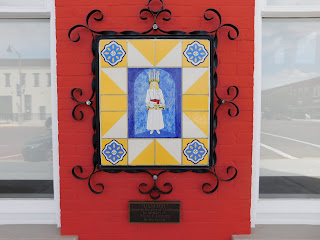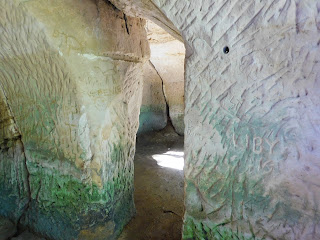The third day of the loop
found us in Lindsborg, KS. It is
advertised as a Scandinavian Town.
Indeed you could see the influence all over town of its ancestry. From the Dala horses painted in all manners
all over the town ,
There was even a “Tala Dala”
To the brightly colored homes.
Of course there was a
restaurant to be tried. Too bad we
didn’t check the prices before we sat down.
The food was decent at the Swedish Crown, but not worth the big bucks it
cost. Also, it would have been nice if
it had been a bit more decorated in a mother country style instead of the local
diner look.
One of the best things about
Lindsborg was doing the “scavenger hunt”.
It was a local walking tour that had you looking for various landmarks
and was really interesting to do.
Everything was on the main street and took less than an hour to do. It was, of course, a free activity. My favorite!
Here are a few photos of some
of the things we saw while doing the scavenger hunt.
Santa Lucia was everywhere in
town.
,
The town itself is unique in
some of its buildings. It was very
fascinating to visit.
In Lindsborg there is
also The Old Mill Museum which,
unfortunately, was closed the day we went there. As was the reproduction of the
World’s Fair
Pavilion Lindsborg had once done.
So we had to be content to just walk around both of those on the outside. If we should ever venture back this way we will definitely visit the insides of both these museums.
,
At the edge of town Gary
spotted this fellow sitting on a front porch.
Another unique place we went
was Farris Caves. It was a simple man
made cave with two entrances.
Unfortunately like the Mushroom Rock vandals had been there as well.
Insert pho790-91, 95-96,
99-800,.
To round out the day we
visited the Hodgen House Museum Complex in Ellsworth, Kansas.
We were given a guided tour of
all the floors with explanations of each of the rooms.
There were many unique
objects, like the 10 hour watch. Until
visiting this museum we had no idea that there had been a movement in France in
1793 to push everything to the metric system including the hours in the day,
the days in the week and months in the year.
This might help explain some
of the confusion on dates in genealogy research from that time period.
Another interesting bit of
housing trivia we were told at one point in history homes were
taxed based on the number of rooms in the home, not the square footage and
closets were considered rooms. This is
why many homes of that era had no closets in them.
Further research on my part later showed that this was a myth.
We were so busy enjoying the
museum grounds which includes many other buildings that were closed for various
reasons we forgot to take the camera into the museum.
I started out snapping a few
photos with my phone, but quickly forgot about taking photos because the talk
given by the volunteer was so interesting. Here are the few items I did get:
The first one is a bread
machine, yes you read right. The instructions
for using it were even on the lid.
I had never seen a steam iron
such as this one either.
Upstairs in the sewing room
there was a piece of furniture that the volunteer had no idea what it was, so I
snapped a photo and then posted it for some of my friends who are antique savy
and learned for both myself and the museum that it was a yarn, ribbon or thread
display cabinet.
The volunteer also took us to
the trapper’s log cabin. It was
outfitted with all the necessities of life, an early tiny house for certain.
It was late in the day when we
left the museum, but our ticket was good for both it and Ft. Harker, so we
drove straight to the fort, however, we
got there after closing so we just read signs and took some outside
photos. We could have gone back the next
day, but we were running out of time for that area.
Insert FT. Harker photos
All in all it was a very good
visit in this area. I want to take this
opportunity to thank our friend Cliff Chisum for suggesting we visit the
Kanapolis area.
















































